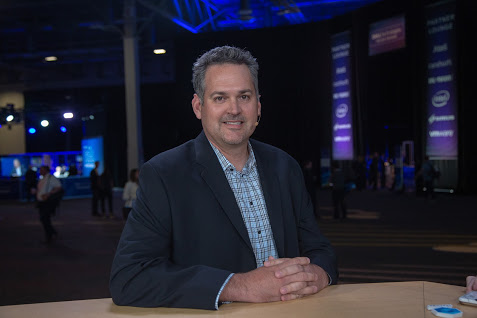 AI
AI
 AI
AI
 AI
AI
Digital transformation is made possible partly because of data, and the growing amount of data makes it nearly impossible for humans alone to analyze it all. Enter artificial intelligence. Through this type of machine learning, organizations are able to gather valuable information from data and do more than they’d ever imagined.
“People say AI is magic,” said Matt Hausmann (pictured), senior consultant in product marketing at Dell EMC. “Well, at the end of the day, it’s some advanced math on a lot of data, right? But the value we’re getting, the data that we can actually access there, and the questions that we can ask of our data, have a really human impact can help us in our daily lives. And, yeah, absolutely there’s going to be a business impact with it as well.”
Hausmann spoke with Lisa Martin (@LisaMartinTV) and John Furrier (@furrier), co-hosts of theCUBE, SiliconANGLE Media’s mobile livestreaming studio, during the Dell Technologies World event in Las Vegas. They discussed digital transformation, data growth, and how AI is harnessing the power of the increasing amount of data (see the full interview with transcript here). (* Disclosure below.)
[Editor’s note: The following answers have been condensed for clarity.]
Martin: There’s so much data these days that it’s just not parsable by humans anymore. Talk to us about the data avalanche; from your perspective in product marketing, what are you seeing? What are you hearing from customers?
Hausmann: I come from our unstructured data solutions business. We really focus and specialize in where a lot of this data growth is coming from — images, audio, video, free text, and things like that. We’re dealing with that day in and day out. You hit the nail on the head. About 80% of our data is no longer human parsable. To really take advantage of that and move forward with the digital transformation, that’s where we’re really seeing new techniques like artificial intelligence, machine learning, deep learning. They’re really helping us ask new questions about data and actually get more value from the data.
Furrier: Now data with AI has to be available and addressable in new kinds of ways. Where’s the customer on that spectrum of the new way to use data? And what is the new way to use data?
Hausmann: About a third of our customers have dipped their toe into AI. So truly, they’re realizing there’s value in that data. They’re realizing these new techniques are available to them, compute’s gotten faster, and there’s been a lot of innovation with storage. So they can do a lot more with the data than they ever could before.
Martin: What are some of the things that Dell EMC is doing to infuse AI capabilities into your storage, servers, data protection, etc.?
Hausmann: We’re bringing a lot of innovation to bring AI to the forefront. On the storage side, I guess I’d call out one of our products called Isilon. What we’re really doing there is trying to simplify this delivery of data for AI — so high performance, high bandwidth at massive scale. Then we’re partnering with the accelerated compute vendors — the Nvidia, the Intel. We’re bringing that into our PowerEdge servers delivering 10x and 100x performance.
People have been dipping their toes. That means that we’ve been doing [proof of concepts], and we’ve been doing this work for years and years. So we’re taking these innovations, we’re taking those learnings, and we’re packaging those up into our Ready Solutions into our Reference Architectures really making AI simple and accessible, and more than anything else, making it faster. We’ve thought through all the things you need to think through in that space and give you a place to start where we can really just start focusing on artificial intelligence — on the art of the possible.
Furrier: Give examples on where they can start small with data — a small project. What’s a great starting point to put the foot in the water and then ultimately full immersion?
Hausmann: I wouldn’t just start people with a data project. I would ask them the business problem they’re trying to solve. What data do I have available? Then I would go give them a suggestion and maybe what the right solution might be.
I also like what you mentioned — start small and get bigger. So we really focus on the scale outside of it. All of the analytic and AI solutions that I work on, we’ve decoupled compute and storage, which basically let’s you grow either your data or your compute power independently. That really lets us right-size solutions for whatever that business case.
Watch the complete video interview below, and be sure to check out more of SiliconANGLE’s and theCUBE’s coverage of the Dell Technologies World 2019 event. (* Disclosure: Dell Technologies Inc. sponsored this segment of theCUBE. Neither Dell nor other sponsors have editorial control over content on theCUBE or SiliconANGLE.)
Support our mission to keep content open and free by engaging with theCUBE community. Join theCUBE’s Alumni Trust Network, where technology leaders connect, share intelligence and create opportunities.
Founded by tech visionaries John Furrier and Dave Vellante, SiliconANGLE Media has built a dynamic ecosystem of industry-leading digital media brands that reach 15+ million elite tech professionals. Our new proprietary theCUBE AI Video Cloud is breaking ground in audience interaction, leveraging theCUBEai.com neural network to help technology companies make data-driven decisions and stay at the forefront of industry conversations.